浅谈英语无灵主语句
高中英语高考读后续写无灵主语知识讲解

高考英语读后续写无灵主语讲解“无灵主语”简单理解就是“没有生命力”的东西做主语。
比如时间,地点,自然现象等。
“有灵动词”简单理解就是把没有生命力的东西,赋予有生命力的动作。
比如上一句Mylove goes to everybody.中love就是没有生命力的名词,但是go就是有生命。
无灵主语句=无灵主语+有灵动词一、无灵主语的优点1.增加主语的多样性。
往往在写作时,我们会反复用同一有生命的词作主语,使语句显得单调,重复。
这些总在不经意之间常常发生。
例如 We don’t think so.If we want light,we must conquer darkness. 我们并不这么认为。
如果我们想要光明,我们就必须征服黑暗。
三个we的使用,使句子显得平淡,甚至别扭,但如果稍加变动,句子会显得协调的多。
Wedon’t think so.If we want light,darkness must be conquered. 我们并不这么认为。
如果我们想要光明,黑暗就必须被征服。
2.增使语言更生动化。
将无生命的事物作主语而展开的句子,往往会用上比喻、拟人等修辞手法,语言随之提升一个档次。
这也就是无灵主语的难点所在,也是华丽之处。
需要注意的是,并不是简单的主动语态变为被动语态,而是用主动语态去表达被动意义。
比如:I forgot his name.我们忘了他的名字了。
并不是简单地变为His name was forgotten by me.而应当更为形象的用主动语态表示。
比如我们可以说:“他的名字溜出了我的大脑。
”His name slipped my mind.“他的名字没有在我头脑中扎根。
”His name didn't take root in my mind.其实要写这样的句子并不难,只要掌握这种思想,加上一段时间的练习,肯定会下笔如有神。
再比如:He was excited.他很兴奋。
英语无灵主语句
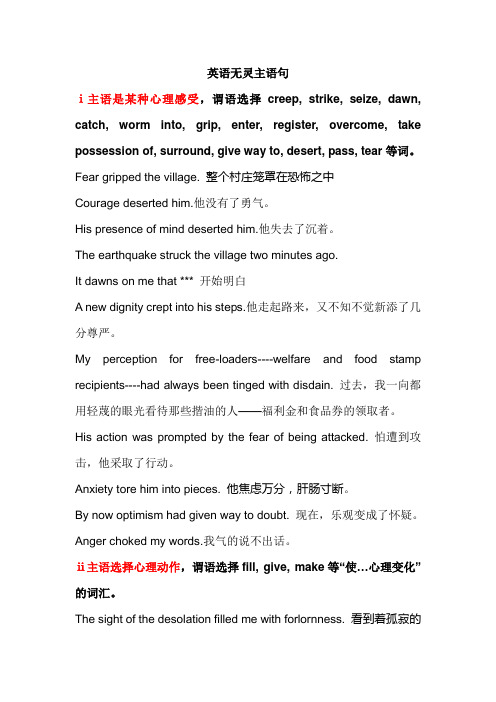
英语无灵主语句ⅰ主语是某种心理感受,谓语选择creep, strike, seize, dawn, catch, worm into, grip, enter, register, overcome, take possession of, surround, give way to, desert, pass, tear等词。
Fear gripped the village. 整个村庄笼罩在恐怖之中Courage deserted him.他没有了勇气。
His presence of mind deserted him.他失去了沉着。
The earthquake struck the village two minutes ago.It dawns on me that *** 开始明白A new dignity crept into his steps.他走起路来,又不知不觉新添了几分尊严。
My perception for free-loaders----welfare and food stamp recipients----had always been tinged with disdain. 过去,我一向都用轻蔑的眼光看待那些揩油的人——福利金和食品券的领取者。
His action was prompted by the fear of being attacked. 怕遭到攻击,他采取了行动。
Anxiety tore him into pieces. 他焦虑万分,肝肠寸断。
By now optimism had given way to doubt. 现在,乐观变成了怀疑。
Anger choked my words.我气的说不出话。
ⅱ主语选择心理动作,谓语选择fill, give, make等“使…心理变化”的词汇。
The sight of the desolation filled me with forlornness. 看到着孤寂的景象,我心中满是凄凉。
体现英语思维的句型——无灵主语句
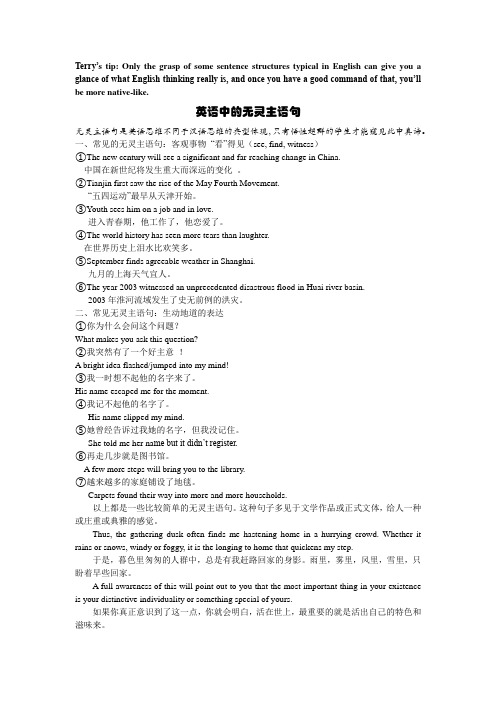
Terry’s tip: Only the grasp of some sentence structures typical in English can give you a glance of what English thinking really is, and once you have a good command of that, you’ll be more native-like.英语中的无灵主语句无灵主语句是英语思维不同于汉语思维的典型体现,只有悟性超群的学生才能窥见此中真谛。
一、常见的无灵主语句:客观事物“看”得见(see, find, witness)①The new century will see a significant and far-reaching change in China.中国在新世纪将发生重大而深远的变化。
②Tianjin first saw the rise of the May Fourth Movement.“五四运动”最早从天津开始。
③Youth sees him on a job and in love.进入青春期,他工作了,他恋爱了。
④The world history has seen more tears than laughter.在世界历史上泪水比欢笑多。
⑤September finds agreeable weather in Shanghai.九月的上海天气宜人。
⑥The year 2003 witnessed an unprecedented disastrous flood in Huai river basin.2003年淮河流域发生了史无前例的洪灾。
二、常见无灵主语句:生动地道的表达①你为什么会问这个问题?What makes you ask this question?②我突然有了一个好主意!A bright idea flashed/jumped into my mind!③我一时想不起他的名字来了。
无灵主语句[整理版]
![无灵主语句[整理版]](https://img.taocdn.com/s3/m/4771b952f08583d049649b6648d7c1c708a10bd8.png)
英语无灵主语句一.主语是情感状态的抽象名词谓语选择如:creep, strike, seize, dawn, catch, worm into, grip, enter, register, overcome, take possession of, surround, give way to, desert, pass, tear 等词。
1. Fear gripped the village. 整个村庄笼罩在恐怖之中。
2. Courage deserted him. 他没有了勇气。
3. His presence of mind deserted him. 他失去了沉着。
4. The earthquake struck the village two minutes ago.5. A new dignity crept into his steps. 他走起路来,不知不觉添了几分尊严。
6. Anxiety tore him into pieces. 他焦虑万分,肝肠寸断。
7. By now optimism had given way to doubt. 现在,乐观变成了怀疑。
8. Anger choked my words. 我气的说不出话。
9. Astonishment deprived me of my power of speech. 我惊讶得说不出话来。
10. Neither sorrow nor regret followed my passionate outburst.我这样发作一通之后,既不难过,也不后悔。
11. A chill of horror suddenly swept over him. 他突然感到不寒而栗。
12. Despair seized him at the thought of her setting out alone to renew theweary quest for work.想起她一个人出去重新登上找工作的艰辛路途,他觉得万念俱灰。
英语无灵主语句类型、特征及翻译方法-英语论文-语言学论文

英语无灵主语句类型、特征及翻译方法-英语论文-语言学论文——文章均为WORD文档,下载后可直接编辑使用亦可打印——摘要:英语无灵主语句是英语书面语中常见的一种句型,也是英语中独特的语言现象。
由于中西方文化、思维方式的差异,理解和运用这种句型对中国学生来说是一个难点。
本文探讨了英语无灵主语句的形成原因、类型、句型特点以及翻译方法,旨在帮助学生更深入了解无灵主语句,避免汉语的负迁移,形成英语思维模式,使语言表达更地道、更准确。
关键词:无灵主语; 有灵主语; 思维差异;英语无灵主语句是英语书面语中一种常见的句式结构,也是一种独特的语言现象。
按照句子主语有无生命来分类,主语可分为有灵主语和无灵主语两种类型。
有灵主语句无论是在汉语还是英语中都是常用的表达方式,但是无灵主语句在英语中相对使用较多。
英语句子结构常用inanimate subject(无灵主语)+animate verb(有灵动词),而汉语句子结构则常用animate subject(有灵主语)+animate verb(有灵动词)。
英语无灵主语句的使用不仅可以准确地表达思想和观念,也能够反映出对语言的熟练掌握。
但是这种句型经常会给中国学生带来理解和运用的困难,有必要对其进行分析和研究,使学生英语水平提高,语言表达更地道、更准确。
一、形成原因语言是思维和文化的载体,思维和文化的差异也能通过语言表达体现出来。
汉语句式多是有灵主语,体现了以人为中心的思维方式;英语句式多是无灵主语,体现了客观判断,逻辑性和准确性。
不同的哲学思想对人们的思维方式产生了很大的影响。
中国传统思想把主体自身作为宇宙中心,认为认识了自身就认识了自然界和宇宙的根本规律,用主体的修养代替对客体的认识,主客一体。
这种主体性思维方式往往从自我出发来理解、解释,描写客观世界中的事物。
西方思维传统以自然为认知对象,强调客观性,认为只有认识自然才能把握自然,只有探索自然才能征服自然,因此主体客体二分,将自然作为自身之外的对象来研究。
28.3.1--无灵主语的特点

28.3.1--无灵主语的特点
1) 英语无灵主语句表达生动有力
例: The year 1998 witnessed an unprecedented disastrous flood in Changjiang River basin.1998年长江流域发生了史无前例的洪灾。
2)英语无灵主语句客观公正
例: Informed guesswork suggests that major tax changes are being considered by the Treasury Department.消息灵通人士猜测,财政部正考虑对税收作重大改革。
3)英语无灵主语句表达紧凑、简洁、凝练
例: High efficiency without anger makes her an angel.她办事效率高,又不发火,简直是个天使。
4)无灵主语句显得更加庄重、含蓄、幽默,多使用在正规文体例: The world history has seen more tears than laughter. 在世界历史上,泪水比欢笑多。
5)无灵主语句往往有拟人化的修辞色彩
例: A strange peace came over her when she was alone. 她独处便感到一种特殊的安宁。
总之无灵主语句是地道的英美人在正式文体中经常使用的表达方式。
这并不意味着不分场合不分语境走极端。
应该充分了解无灵主语句的产生及特点和翻译策略,从而更地道的使用英语。
体现英语思维的句型——无灵主语句

Terry’s tip: Only the grasp of some sentence structures typical in English can give you a glance of what English thinking really is, and once you have a good command of that, you’ll be more native-like.英语中的无灵主语句无灵主语句是英语思维不同于汉语思维的典型体现,只有悟性超群的学生才能窥见此中真谛。
一、常见的无灵主语句:客观事物“看”得见(see, find, witness)①The new century will see a significant and far-reaching change in China.中国在新世纪将发生重大而深远的变化。
②Tianjin first saw the rise of the May Fourth Movement.“五四运动”最早从天津开始。
③Youth sees him on a job and in love.进入青春期,他工作了,他恋爱了。
④The world history has seen more tears than laughter.在世界历史上泪水比欢笑多。
⑤September finds agreeable weather in Shanghai.九月的上海天气宜人。
⑥The year 2003 witnessed an unprecedented disastrous flood in Huai river basin.2003年淮河流域发生了史无前例的洪灾。
二、常见无灵主语句:生动地道的表达①你为什么会问这个问题?What makes you ask this question?②我突然有了一个好主意!A bright idea flashed/jumped into my mind!③我一时想不起他的名字来了。
英语无灵主语句
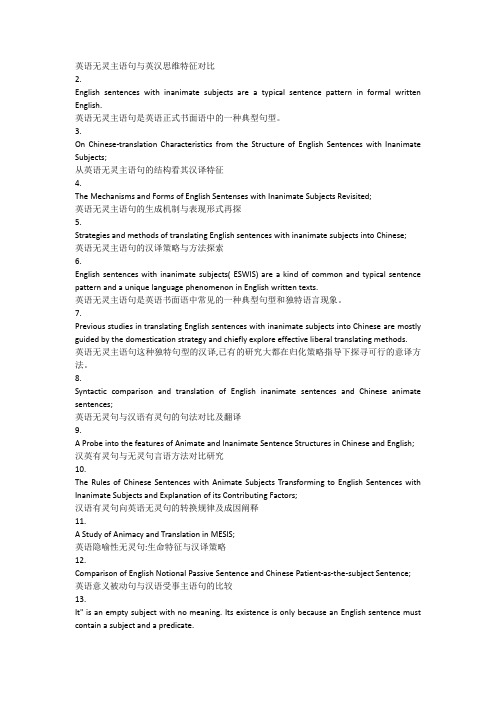
英语无灵主语句与英汉思维特征对比2.English sentences with inanimate subjects are a typical sentence pattern in formal written English.英语无灵主语句是英语正式书面语中的一种典型句型。
3.On Chinese-translation Characteristics from the Structure of English Sentences with Inanimate Subjects;从英语无灵主语句的结构看其汉译特征4.The Mechanisms and Forms of English Sentenses with Inanimate Subjects Revisited;英语无灵主语句的生成机制与表现形式再探5.Strategies and methods of translating English sentences with inanimate subjects into Chinese;英语无灵主语句的汉译策略与方法探索6.English sentences with inanimate subjects( ESWIS) are a kind of common and typical sentence pattern and a unique language phenomenon in English written texts.英语无灵主语句是英语书面语中常见的一种典型句型和独特语言现象。
7.Previous studies in translating English sentences with inanimate subjects into Chinese are mostly guided by the domestication strategy and chiefly explore effective liberal translating methods.英语无灵主语句这种独特句型的汉译,已有的研究大都在归化策略指导下探寻可行的意译方法。
无灵主语句三种句型

无灵主语句三种句型
无主语句是指句子中缺少主语,而且其他成分也没有发生变化的句子。
它在口语中经常出现,并且对交流有很大的帮助。
一般来说,无主语句可以分为三种:动词、形容词和副词句。
一、动词句
动词句是最常见的无主语句,即句子中只有一个动词,没有其他成分,表示一种动作或状态。
例如:Come. (来)、Go.(去)、Wait.(等待)、Stop.(停止)等。
这种句型有很多用法,可以用来表达要求、命令、提醒、询问或者仅仅用来引起对方的注意。
它们常常用在口语中,因为它们非常简洁,而且能够表达情感,使用起来更加方便。
二、形容词句
形容词句是只有一个形容词的句子,用来表达一种特定的状态或情况。
例如:Ready.(准备好)、Alone.(独自)、Ready.(准备好)、Lonely.(孤独)等。
形容词句也可以用来表达请求、命令、提醒、询问等。
例如:Ready?(准备好了吗? )、AIOne!(独自!)、Ready!(准备好了! )、Lonely!(孤独!)等。
三、副词句
副词句是只有一个副词的句子,用来表达一种特定的状态或情况。
例如:Now.(现在)、Well.(好)、Sure.
(当然)、Maybe.(也许)等。
副词句也可以用来表达请求、命令、提醒、询问等。
它们可以用来表达一种犹豫、思考的心理,使用起来更加地灵活。
总的来说,无主语句是一种简洁、便捷的句式,它可以用来表达要求、命令、提醒、询问等,也可以用来表达一种犹豫、思考的心理,使用起来更加地灵活。
它在口语中使用比较多,也常常出现在文学作品中,可以使句子显得更加简洁、有力。
无灵主语句型
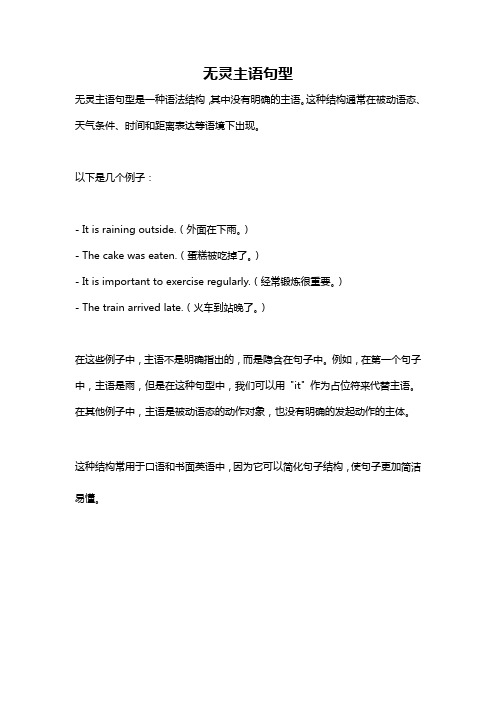
无灵主语句型
无灵主语句型是一种语法结构,其中没有明确的主语。
这种结构通常在被动语态、天气条件、时间和距离表达等语境下出现。
以下是几个例子:
- It is raining outside.(外面在下雨。
)
- The cake was eaten.(蛋糕被吃掉了。
)
- It is important to exercise regularly.(经常锻炼很重要。
)
- The train arrived late.(火车到站晚了。
)
在这些例子中,主语不是明确指出的,而是隐含在句子中。
例如,在第一个句子中,主语是雨,但是在这种句型中,我们可以用"it" 作为占位符来代替主语。
在其他例子中,主语是被动语态的动作对象,也没有明确的发起动作的主体。
这种结构常用于口语和书面英语中,因为它可以简化句子结构,使句子更加简洁易懂。
浅谈英语无灵主语句
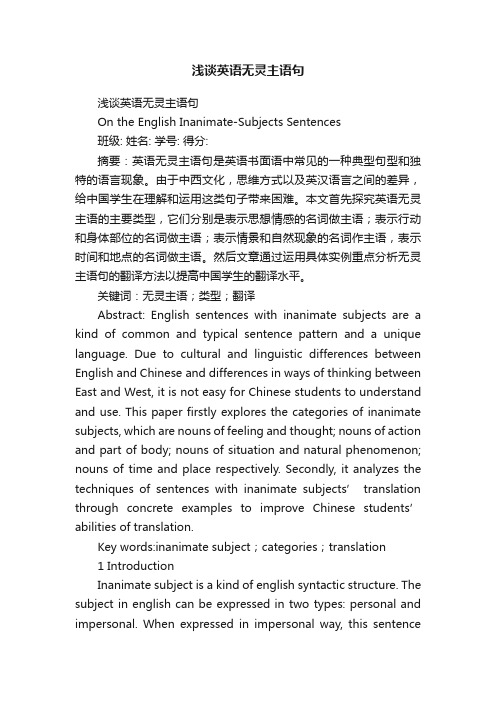
浅谈英语无灵主语句浅谈英语无灵主语句On the English Inanimate-Subjects Sentences班级: 姓名: 学号: 得分:摘要:英语无灵主语句是英语书面语中常见的一种典型句型和独特的语言现象。
由于中西文化,思维方式以及英汉语言之间的差异,给中国学生在理解和运用这类句子带来困难。
本文首先探究英语无灵主语的主要类型,它们分别是表示思想情感的名词做主语;表示行动和身体部位的名词做主语;表示情景和自然现象的名词作主语,表示时间和地点的名词做主语。
然后文章通过运用具体实例重点分析无灵主语句的翻译方法以提高中国学生的翻译水平。
关键词:无灵主语;类型;翻译Abstract: English sentences with inanimate subjects are a kind of common and typical sentence pattern and a unique language. Due to cultural and linguistic differences between English and Chinese and differences in ways of thinking between East and West, it is not easy for Chinese students to understand and use. This paper firstly explores the categories of inanimate subjects, which are nouns of feeling and thought; nouns of action and part of body; nouns of situation and natural phenomenon; nouns of time and place respectively. Secondly, it analyzes the techniques of sentences with inanimate subjects’ translation through concrete examples to improve Chinese students’ abilities of translation.Key words:inanimate subject;categories;translation1 IntroductionInanimate subject is a kind of english syntactic structure. The subject in english can be expressed in two types: personal and impersonal. When expressed in impersonal way, this sentencedoes emphasize the thing happening on the person, while in Chinese it can be translated into"什么人怎么样了". Furthermore, the impersonal subject also can be divided into two types: inanimate subject and animatesubject . This article mainly talks about the inanimate subject.2 Animate verbThe impersonal subject sentence with inanimate subject usually indicate the abstract concept , psychological feeling , concrete subject or time and place and so on,however, the predicate in this sentence usually is "animate verb" which indicate the person's or group's action and behaviour, like see, desert, find, bring, witness, give, escape, surround, kill, deprive, serve, send, know, tell, permit, invite, take, drive, prevent from and so on, and this kind of sentence is often rhetorical and carry personification.E.g. 1 Past experience has taught us that we should not depend on others for everything.E.g. 2 His name slips my mind.E.g. 3 A good idea suddenly strikes me.E.g. 4 A strange peace came over her when she was alone.3 The categories of inanimate subjects3.1 Nouns of feeling and thoughtEg.Having seen the man,a chill of horror suddenly swept over her. /看到那个人,她突然有种不寒而栗的感觉。
什么是无灵主语[整理版]
![什么是无灵主语[整理版]](https://img.taocdn.com/s3/m/f1a7616ac77da26924c5b030.png)
什么是无灵主语[整理版]什么是无灵主语,无灵主语的概念极为简单:有无生命的事物做主语来展开句子。
其实它向我们传达的只是一种思维,一种思考的方式而已。
什么是无灵主语, Eg: I love everbody.译为:我爱大家。
如果出现在口语中,这样的表达当然最为清晰,但如果出现在写作中,如下表达可能更为生动一些:My love goes to everbody.从例子可以看出,用客观的事物love代替有生命的I,这就是无灵主语的实质。
但我们为什么要使用无灵主语,它究竟有什么优点呢, (1)增加主语的多样性。
往往在写作时,我们会反复用同一有生命的词作主语,使语句显得单调,重复。
这些总在不经意之间常常发生。
Eg: We don’t think so.If we want light,we must conquer darkness. 三个we的使用,使句子显得平淡,甚至别扭,但如果稍加变动,句子会显得协调的多。
? We don’t think so.If we want light,darkness must be conquered. ? This idea can’t acquire our ac ceptance,If we want light,we must conquer darkness. (2)使语言更生动化。
将无生命的事物作主语而展开的句子,往往会用上比喻、拟人等修辞手法,语言随之提升一个档次。
Eg: 青少年常常沉迷于网络。
Indulge(sb) in, be addicted in; Be absorbed in; pay attentionto;concentrate on.Internet is Pandora’s Box for youth. 这也就是无灵主语的难点所在,也是华丽之处:并不是简单的主动语态变为被动语态,而是用主动语态去表达被动意义。
Eg: People accepted the fact.人们接受这个事实。
高中英语-无灵主语

什么是无灵主语句无灵主语句,是指用无生命的事物做主语,用人或社会团体的行为或动作做谓语,因此这类句子常带有拟人化的修辞色彩。
该句的主语Rome罗马,是无生命的事物,但谓语witness目击,是人的动作。
这种“无灵主语+有灵谓语”的句式,就是无灵主语句。
无灵主语句的亮点在哪?举例对比一下:普通句:She had a good idea.无灵主语句:A good idea came across her mind. / A good idea struck her./ A good idea occurred to her.同样是表达“她有了个好主意”,比起普通句式中的常见句子,无灵主语句中这种拟人化表达,明显更生动、更高级!无灵主语句的分类在读后续写中,无灵主语句的使用主要是有5类。
1. 情感状态的抽象名词+谓语在读后续写中写到人物的情绪或心理时,不要总用sb. feel...,尝试一下无灵主语句。
例如:Fear gripped the village. 整个村庄笼罩在恐怖之中。
Courage deserted him. 他失去了勇气。
Anger choked my words. 我气得说不出话。
A wave of nervousness washed over him. 一阵紧张的情绪涌上他的心头。
A chill of horror suddenly swept over him. 他突然感到不寒而栗。
Excitement seized him. 他好兴奋。
这种拟人化的描写,将情绪生动地表达出来,在考试中绝对加分!补充一些相关常见词汇,大家续写时,可以根据文中的情绪,挑选恰当的词自行搭配。
常见的情绪名词:happiness, joy, delight 开心快乐surprise, astonishment 惊奇,惊讶shame 羞耻,羞愧anger 愤怒despair 绝望regret 遗憾,后悔sorrow 悲伤horror 惊恐anxiety 焦虑disappointment 失望,沮丧satisfaction 满意,满足puzzlement 困惑不解常见的谓语动词:seize 侵袭choke 噎住,堵住flood 充满creep 不知不觉产生grip 紧抓give way to 被……代替wash over 洗涤,侵袭deserted 丢弃,遗弃2. 思考/动作行为的名词+谓语在读后续写中描写人物动作或思考行为时,也可以使用无灵主语句。
高中英语无灵主语讲义及练习

无灵主语什么是无灵主语句呢?即没有生命的事物来做主语的句子,因此这类句子常常带有拟人化的修辞色彩。
比如,”北京见证了数不清的历史事件。
”无灵主语句在读后续写中非常地常见,正确而又恰当地使用它,可以让句子的描写更加生动。
运用“无灵”主语句,能突出人物的心理情感,使续写语言更加生动形象、栩栩如生➢下面我将从五个方面阐明它的运用。
■句式1在读后续写中写到人物的情绪或心理时,不要总用sb feel...,尝试一下无灵主语句,可以让阅卷老师读起来更有画面感。
(a burst/wave/surge/rush/ripple/sense/feeling of+)表情感状态的名词十有灵动词十sb.表“某人感到…”或“一阵/一种……向某入袭来”常见的情感名词有:开心:happiness/joy/delight 愤怒:anger/rage/fury/irritation 悲伤:sadness/ sorrow/grief 感激:appreciation/gratitude 钦佩/赞赏:admiration/appreciation 悔恨/愧疚:remorse/guilt/shame 害怕:fear/terror/fright/horror/panic 震惊: astonishment/shock/amazement/surprise 满足:satisfaction 困惑:puzzlement/confusion用于该句式的有灵动词(短语)有:seize/take hold of “抓住;攫住”;get the better of/defeat“击垮”;sweep/flood/rush over“袭来”;creep upon “慢慢产生” ;come over “影响” ; run through/pass through “掠过” ;swallow“吞噬;淹没”;choke “使哽咽” ;tear...into pieces “把……撕碎” ;fail“使失望;有负于”等。
英语无灵主语讲义

英语无灵主语讲义___主语是指使用无生命的事物作为句子的主语。
它向我们传达的只是一种思维,一种思考的方式。
例如,将"I love everybody"翻译为"我爱大家"是口语中最为清晰的表达方式,但在写作中,使用"___"可能更为生动。
这种用客观的事物代替有生命的主语的方式,就是无灵主语的实质。
使用无灵主语有以下优点:1.增加主语的多样性。
在写作时,反复使用同一有生命的词作主语会使语句显得单调和重复。
例如,使用"We"三次的句子显得平淡,但稍加变动,就可以使句子更协调。
2.使语言更生动化。
使用无生命的事物作主语展开的句子,常常会使用比喻、拟人等修辞手法,使语言更具有表现力。
使用无灵主语并不是简单的主动语态变为被动语态,而是用主动语态去表达被动意义。
例如,"People accepted the fact"并不是简单地变为"___",而应该更为形象地用主动语态表示被动意义。
人们接受这个事实,就是这个事实获得人们的认可:"___"。
掌握无灵主语的思想,加上一段时间的练,就可以下笔如有神地写出这样的句子。
The n should be made more objective when the subject is a living thing。
as the ___ related to the living ___。
if the subject is non-living。
the n is ___-living ___ to English and are also commonly used in Chinese。
For example。
"we learn from life" can be expressed as "life tells us." "Motherland。
高考写作无灵主句知识讲义-高三英语二轮复习

高考英语写作无灵主句一、定义无灵主语就是用无生命的事物作主语。
【例句】1.Shock deprived me of my power of speech.我惊讶得说不出话来2.Horror rulled the whole room.恐惧笼罩了整个房间。
3.The past three years witnessed our growth.过去的三年见证了我们的成长综上例句所述,无灵主句=无灵主语+有灵动词(+宾语)这类动词常用的为:看见see 发现find带来bring见证witness 给予give逃离escape 包围surround剥夺deprive提供serve发送赠送send告诉/见证tell允许permit邀请invite拿/带take驱使drive阻止prevent 等二、分类无灵主语共有四类第一类表示的情感/状态名词作主语例句:1.我紧张得说不出话来。
Tension choked my words.2.我心中充满了喜悦。
A thrill of joy flooded me.3.她失去了勇气。
Courage deserted her .【练习】他惊慌失措。
【答案】Panic seized him表情感/状态的常见名词汇总:开心 delight 激动 thrill放松 relaxation 满意 satisfaction震惊 shock 悲伤sorrow绝望desperation沮丧 frustration愤怒 rage焦虑 anxiety疲惫exhaustion恐惧 fear/horror困惑 confusion羞愧shame尴尬embarrassment孤独loneliness第二类表示思考/动作行为的名词作主语例句:我脑子里闪过一个可怕的念头An awful thought struck me.我们爬了50分钟到了山顶。
A 50 minutes' climbing brought us to the top of the mountain. 【练习】看到这个情景使我心中充满了幸福。
人教新课标 高三英语一轮复习 无灵主语句,让写作地道且灵动 课件

常见表达: The sight of...看到... The thought of...想到...
我们步行十分钟就到了目的地。
eg: 一看到闹钟,我就知道我迟到了。 The sight of the clock reminded me that I was late.
1.看到这个情景,我心中满是恐惧。
(NSEFC)Book 1 Unit 5
The last thirty years have seen the greatest number of laws stopping our rights and progress,until today we have reached a stage where we have almost no rights at all.
lonely— loneliness;
puzzle — puzzlement;
regret — regret;
relieve— relief ;
sad — sadness;
satisfy — satisfaction;
shame——shame; sorry — sorrow;
surprise — surprise...
preparations. All the words slipped my mind absolutely. After class, m
Category 4.使用抽象名词作主语
应用文:
1.我无法用言语来表达我衷心的感谢。(感谢信)
Words fail me when I try to express my heartfelt gratitude .
2.你的出席一定会给我们的活动添彩。(邀请信)
Your presence will surely add color to our activity.
英语无灵主语句谚语研究
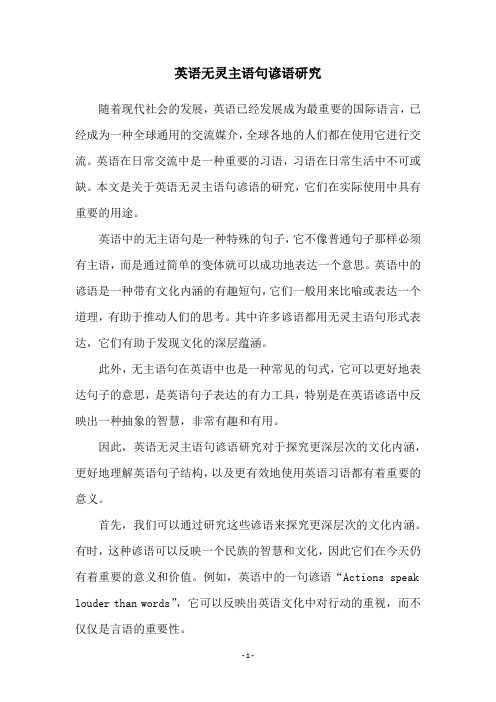
英语无灵主语句谚语研究随着现代社会的发展,英语已经发展成为最重要的国际语言,已经成为一种全球通用的交流媒介,全球各地的人们都在使用它进行交流。
英语在日常交流中是一种重要的习语,习语在日常生活中不可或缺。
本文是关于英语无灵主语句谚语的研究,它们在实际使用中具有重要的用途。
英语中的无主语句是一种特殊的句子,它不像普通句子那样必须有主语,而是通过简单的变体就可以成功地表达一个意思。
英语中的谚语是一种带有文化内涵的有趣短句,它们一般用来比喻或表达一个道理,有助于推动人们的思考。
其中许多谚语都用无灵主语句形式表达,它们有助于发现文化的深层蕴涵。
此外,无主语句在英语中也是一种常见的句式,它可以更好地表达句子的意思,是英语句子表达的有力工具,特别是在英语谚语中反映出一种抽象的智慧,非常有趣和有用。
因此,英语无灵主语句谚语研究对于探究更深层次的文化内涵,更好地理解英语句子结构,以及更有效地使用英语习语都有着重要的意义。
首先,我们可以通过研究这些谚语来探究更深层次的文化内涵。
有时,这种谚语可以反映一个民族的智慧和文化,因此它们在今天仍有着重要的意义和价值。
例如,英语中的一句谚语“Actions speak louder than words”,它可以反映出英语文化中对行动的重视,而不仅仅是言语的重要性。
其次,研究无灵主语句谚语可以帮助我们更好地理解英语句子结构。
谚语有时可以使用简短的语言表达的更多的意义,它们中有些看起来很简单,但这里包含着一种抽象的思想,这就是它们的魅力所在。
例如,英语中的一句谚语“When in Rome, do as the Romans do”,它表达了如果去到一个新的社会,就要尊重他们的文化习惯。
此外,研究无灵主语句谚语也有助于人们更有效地使用英语习语。
每个人都希望能够在日常的交流中使用更多的英语习语,因此研究一些常用的无主语句也是非常有用的。
它可以帮助我们更好地理解习惯用语,并可以更好地将习惯用语应用到语言实践中。
无灵主语:转变一个思维,英文表达更地道

无灵主语:转变一个思维,英文表达更地道无灵主语是英文中非常重要的语法结构,但更是一种表达习惯和思维模式。
什么是无灵主语无灵主语这个概念听起来有点玄妙,但说起来却是很好理解,就是以无生命的事物作为主语,来展开句子。
给大家举个例子。
下面这句话:I lost the courage我失去了勇气如果将courage作为主语,改为:courage deserted me勇气弃我而去就是无灵主语,英文中叫做inanimate subject。
这里“无生命的事物”所指比较广泛,抽象概念、心理感受、事物的名称、时间、地点等等,都包括其中。
无灵主语还有一个特点,就是它的谓语动词往往是“有灵动词”,也就是有生命的事物的动作和行为,比如witness(见证)、greet(迎接)、escape(逃走)、motivate(鼓励)、wait(等待)、tell(告诉)等等。
举例来说:a nervous laugh escapes my throat我不由自主紧张地笑了一声The strike killed two militants and wounded two others这次袭击导致两名激进分子死亡,另两人受伤。
句子中laugh(笑)和strike(袭击)是无灵主语,而escape(逃走),kill(杀死),wound(使受伤)则是有灵动词。
无灵主语与中文表达习惯不符无灵主语并不是什么难掌握的语法点,不过中国学生很少在写作中运用,主要是由于这种表达方式不符合中文习惯。
汉语多用人称做主语,侧重表达“人做事”英语则常用非人称做主语,侧重表达“事对人的作用影响”所以在汉语中,“有灵动词”与“无灵动词”有明显区别:看、听、说、来、离开、邀请、剥夺等等是有灵动词,一般只与有灵主语搭配。
出现、发生、存在、变、吸引、上升是无灵动词,多表示出现消失、存在与变化,一般只有它们才可以和无灵主语搭配。
这样的区别,在英文却中常常是模糊的。
英文中无灵主语和有灵动词搭配,是很常见的表达方式。
- 1、下载文档前请自行甄别文档内容的完整性,平台不提供额外的编辑、内容补充、找答案等附加服务。
- 2、"仅部分预览"的文档,不可在线预览部分如存在完整性等问题,可反馈申请退款(可完整预览的文档不适用该条件!)。
- 3、如文档侵犯您的权益,请联系客服反馈,我们会尽快为您处理(人工客服工作时间:9:00-18:30)。
浅谈英语无灵主语句On the English Inanimate-Subjects Sentences班级: 姓名: 学号: 得分:摘要:英语无灵主语句是英语书面语中常见的一种典型句型和独特的语言现象。
由于中西文化,思维方式以及英汉语言之间的差异,给中国学生在理解和运用这类句子带来困难。
本文首先探究英语无灵主语的主要类型,它们分别是表示思想情感的名词做主语;表示行动和身体部位的名词做主语;表示情景和自然现象的名词作主语,表示时间和地点的名词做主语。
然后文章通过运用具体实例重点分析无灵主语句的翻译方法以提高中国学生的翻译水平。
关键词:无灵主语;类型;翻译Abstract: English sentences with inanimate subjects are a kind of common and typical sentence pattern and a unique language. Due to cultural and linguistic differences between English and Chinese and differences in ways of thinking between East and West, it is not easy for Chinese students to understand and use. This paper firstly explores the categories of inanimate subjects, which are nouns of feeling and thought; nouns of action and part of body; nouns of situation and natural phenomenon; nouns of time and place respectively. Secondly, it analyzes the techniques of sentences with inanimate subjects’ translation through concrete examples to improve Chinese students’ abilities of translation.Key words:inanimate subject;categories;translation1 IntroductionInanimate subject is a kind of english syntactic structure. The subject in english can be expressed in two types: personal and impersonal. When expressed in impersonal way, this sentence does emphasize the thing happening on the person, while in Chinese it can be translated into"什么人怎么样了". Furthermore, the impersonal subject also can be divided into two types: inanimate subject and animatesubject . This article mainly talks about the inanimate subject.2 Animate verbThe impersonal subject sentence with inanimate subject usually indicate the abstract concept , psychological feeling , concrete subject or time and place and so on,however, the predicate in this sentence usually is "animate verb" which indicate the person's or group's action and behaviour, like see, desert, find, bring, witness, give, escape, surround, kill, deprive, serve, send, know, tell, permit, invite, take, drive, prevent from and so on, and this kind of sentence is often rhetorical and carry personification.E.g. 1 Past experience has taught us that we should not depend on others for everything.E.g. 2 His name slips my mind.E.g. 3 A good idea suddenly strikes me.E.g. 4 A strange peace came over her when she was alone.3 The categories of inanimate subjects3.1 Nouns of feeling and thoughtEg.Having seen the man,a chill of horror suddenly swept over her. /看到那个人,她突然有种不寒而栗的感觉。
Despair seized him at the thought of her setting out alone tore new the weary quest for work. /想起她一个人出去重新登上找工作的艰辛路途,他觉得万念俱灰。
The " a chill of horror " and " despair " are feeling and thought.3.2 Nouns of action and part of bodyEg. Many years of hard work changed his father greatly. /多年的辛劳使他父亲大大变样了。
My heart failed me at the sight. /一见那情景我就失去了勇气。
Her eyes were the same color as the sea,cheerful and excited. /她那碧波般的双眸流露着兴奋和激动的神色The subject " many years of hard work " is an action, and " my heart " and " her eyes " are the part of body.3.3 Nouns of situation and natural phenomenonEg.A hush fell upon the assembly. /会场一片寂静。
A heavy rain visited the city. /这个城市刚下过一场大雨。
The subject " a hush " is the situation of assembly, and " a heavy rain " is a natural phenomenon.3.4 Nouns of time and placeEg. Dusk found the little girl crying in the street. /黄昏时分人们发现小女孩在街上哭。
The postwar years in Germany saw honors heaped upon the great scientist. /在德国战后的岁月里,这位伟大的科学家得到了种种荣誉。
The town boasts a beautiful lake. /镇上有个美丽的湖,人人以此自豪。
The city had witnessed many great historic events. /在这个城市曾经发生过许多重大历史事件。
The subject" dusk " and " postwar years " are the nouns of time,and " town " and " city " are the nouns of place.4 T he techniques of sentences with inanimate subjects’ translation4.1 Translation into animate-subject sentenceEg. The job exhausted me. 我已经干得筋疲力尽了。
His name escaped me from the moment.我一时记不起他的名字。
Obviously ,we can find out the logical subjects from the examples above. The logical subjects are "me" behind the verbs, so we can regard it as the direct subject when we translate the sentence into Chinese.4.2 Translation into adverbial clause of reasonThe inanimate-subject sentence can also be translated into adverbial clause of reason, but we should clear the logical relations between the subject and object.For exampleBusiness took him to the town.他因事进城了。
